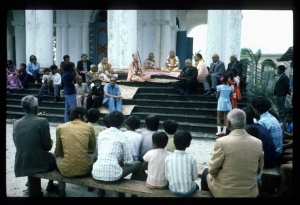CC Madhya 12.56: Difference between revisions
m (1 revision(s)) |
(Vanibot #0054 edit - transform synonyms into clickable links, which search similar occurrences) |
||
| (One intermediate revision by one other user not shown) | |||
| Line 1: | Line 1: | ||
{{ | [[Category:Sri Caitanya-caritamrta - Madhya-lila Chapter 12|C056]] | ||
<div style="float:left">'''[[Sri Caitanya-caritamrta|Śrī Caitanya-caritāmṛta]] - [[CC Madhya|Madhya-līlā]] - [[CC Madhya 12|Chapter 12: The Cleansing of the Guṇḍicā Temple]]'''</div> | |||
<div style="float:right">[[File:Go-previous.png|link=CC Madhya 12.55|Madhya-līlā 12.55]] '''[[CC Madhya 12.55|Madhya-līlā 12.55]] - [[CC Madhya 12.57|Madhya-līlā 12.57]]''' [[File:Go-next.png|link=CC Madhya 12.57|Madhya-līlā 12.57]]</div> | |||
{{CompareVersions|CC|Madhya 12.56|CC 1975|CC 1996}} | |||
{{RandomImage}} | |||
==== TEXT 56 ==== | ==== TEXT 56 ==== | ||
<div | <div class="verse"> | ||
“ātmā vai jāyate putraḥ”—ei śāstra-vāṇī | :“ātmā vai jāyate putraḥ”—ei śāstra-vāṇī | ||
putrera milane yena milibe āpani | :putrera milane yena milibe āpani | ||
</div> | </div> | ||
| Line 12: | Line 16: | ||
==== SYNONYMS ==== | ==== SYNONYMS ==== | ||
<div | <div class="synonyms"> | ||
ātmā vai jāyate | ''[//vanipedia.org/wiki/Special:VaniSearch?s=ātmā&tab=syno_o&ds=1 ātmā] [//vanipedia.org/wiki/Special:VaniSearch?s=vai&tab=syno_o&ds=1 vai] [//vanipedia.org/wiki/Special:VaniSearch?s=jāyate&tab=syno_o&ds=1 jāyate] [//vanipedia.org/wiki/Special:VaniSearch?s=putraḥ&tab=syno_o&ds=1 putraḥ]'' — his self appears as the son; ''[//vanipedia.org/wiki/Special:VaniSearch?s=ei&tab=syno_o&ds=1 ei]'' — this; ''[//vanipedia.org/wiki/Special:VaniSearch?s=śāstra&tab=syno_o&ds=1 śāstra]-[//vanipedia.org/wiki/Special:VaniSearch?s=vāṇī&tab=syno_o&ds=1 vāṇī]'' — the indication of revealed scriptures; ''[//vanipedia.org/wiki/Special:VaniSearch?s=putrera&tab=syno_o&ds=1 putrera] [//vanipedia.org/wiki/Special:VaniSearch?s=milane&tab=syno_o&ds=1 milane]'' — by meeting the son; ''[//vanipedia.org/wiki/Special:VaniSearch?s=yena&tab=syno_o&ds=1 yena]'' — as if; ''[//vanipedia.org/wiki/Special:VaniSearch?s=milibe&tab=syno_o&ds=1 milibe]'' — he will meet; ''[//vanipedia.org/wiki/Special:VaniSearch?s=āpani&tab=syno_o&ds=1 āpani]'' — personally. | ||
</div> | </div> | ||
| Line 19: | Line 23: | ||
==== TRANSLATION ==== | ==== TRANSLATION ==== | ||
<div | <div class="translation"> | ||
“It is indicated in the revealed scriptures that the son represents the father; therefore the son’s meeting with Me would be just as good as the King’s meeting with Me.” | “It is indicated in the revealed scriptures that the son represents the father; therefore the son’s meeting with Me would be just as good as the King’s meeting with Me.” | ||
</div> | </div> | ||
| Line 26: | Line 30: | ||
==== PURPORT ==== | ==== PURPORT ==== | ||
<div | <div class="purport"> | ||
In Śrīmad-Bhāgavatam ([[SB 10.78.36]]) it is said, ātmā vai putra utpanna iti vedānuśāsanam. The Vedas enjoin that one is born as his own son. The son is nondifferent from the father, and this is admitted in every revealed scripture. In Christian theology it is believed that Christ, the son of God, is also God, or in other words that they are identical. | In [[Srimad-Bhagavatam|''Śrīmad-Bhāgavatam'']] ([[SB 10.78.36]]) it is said, ''ātmā vai putra utpanna iti vedānuśāsanam.'' The ''Vedas'' enjoin that one is born as his own son. The son is nondifferent from the father, and this is admitted in every revealed scripture. In Christian theology it is believed that Christ, the son of God, is also God, or in other words that they are identical. | ||
</div> | </div> | ||
__NOTOC__ | |||
<div style="float:right; clear:both;">[[File:Go-previous.png|link=CC Madhya 12.55|Madhya-līlā 12.55]] '''[[CC Madhya 12.55|Madhya-līlā 12.55]] - [[CC Madhya 12.57|Madhya-līlā 12.57]]''' [[File:Go-next.png|link=CC Madhya 12.57|Madhya-līlā 12.57]]</div> | |||
__NOTOC__ | |||
__NOEDITSECTION__ | |||
Latest revision as of 21:35, 19 February 2024

A.C. Bhaktivedanta Swami Prabhupada
TEXT 56
- “ātmā vai jāyate putraḥ”—ei śāstra-vāṇī
- putrera milane yena milibe āpani
SYNONYMS
ātmā vai jāyate putraḥ — his self appears as the son; ei — this; śāstra-vāṇī — the indication of revealed scriptures; putrera milane — by meeting the son; yena — as if; milibe — he will meet; āpani — personally.
TRANSLATION
“It is indicated in the revealed scriptures that the son represents the father; therefore the son’s meeting with Me would be just as good as the King’s meeting with Me.”
PURPORT
In Śrīmad-Bhāgavatam (SB 10.78.36) it is said, ātmā vai putra utpanna iti vedānuśāsanam. The Vedas enjoin that one is born as his own son. The son is nondifferent from the father, and this is admitted in every revealed scripture. In Christian theology it is believed that Christ, the son of God, is also God, or in other words that they are identical.